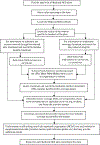Substance use disorder treatment carve outs in Medicaid managed care
- PMID: 38554998
- PMCID: PMC11090713
- DOI: 10.1016/j.josat.2024.209357
Substance use disorder treatment carve outs in Medicaid managed care
Abstract
Introduction: Medicaid managed care organizations (MCO) play a major role in addressing the nation's epidemic of drug overdose and mortality by administering substance use disorder (SUD) treatment benefits for over 50 million Americans. While it is known that some Medicaid MCO plans delegate responsibility for managing SUD treatment benefits to an outside "carve out" entity, the extent and structure of such carve out arrangements are unknown. This is an important gap in knowledge, given that carve outs have been linked to reductions in rates of SUD treatment receipt in several studies. To address this gap, we examined carve out arrangements used by Medicaid MCO plans to administer SUD treatment benefits in ten states.
Methods: Data for this study was gleaned using a purposive sampling approach through content analysis of publicly available benefits information (e.g., member handbooks, provider manuals, prescription drug formularies) from 70 comprehensive Medicaid MCO plans in 10 selected states (FL, GA, IL, MD, MI, NH, OH, PA, UT, and WV) active in 2018. Each Medicaid MCO plan's documents were reviewed and coded to indicate whether a range of SUD treatment services (e.g., inpatient treatment, outpatient treatment, residential treatment) and medications were carved out, and if so, to what type of entity (e.g., behavioral health organization).
Results: A large majority of Medicaid MCO plans carved out at least some (28.6 %) or all (40.0 %) SUD treatment services, with nearly all plans carving out some (77.1 %) or all (14.3 %) medications, mainly due to the carving out of methadone treatment. Medicaid MCO plans most commonly carved out SUD treatment services to behavioral health organizations, while most medications were carved out to state Medicaid fee-for-service plans.
Conclusions: Carve out arrangements for SUD treatment vary dramatically across states, across plans, and even within plans. Given that some studies have linked carve out arrangements to reductions in treatment access, their widespread use among Medicaid MCO plans is cause for further consideration by policymakers and other key interest groups. Moreover, reliance on such complex arrangements for administering care may create challenges for enrollees who seek to learn about and access plan benefits.
Keywords: Carve outs; Managed care; Medicaid; Substance use disorder; Treatment.
Copyright © 2024 Elsevier Inc. All rights reserved.
Conflict of interest statement
Declaration of competing interest None.
Figures
Similar articles
-
Association of Medicaid Managed Care Drug Carve Outs With Hepatitis C Virus Prescription Use.JAMA Health Forum. 2021 Aug 27;2(8):e212285. doi: 10.1001/jamahealthforum.2021.2285. eCollection 2021 Aug. JAMA Health Forum. 2021. PMID: 35977199 Free PMC article.
-
Association Between Medicaid Managed Care Coverage of Substance Use Services and Treatment Utilization.JAMA Health Forum. 2022 Aug 5;3(8):e222812. doi: 10.1001/jamahealthforum.2022.2812. JAMA Health Forum. 2022. PMID: 36218990 Free PMC article.
-
Coverage and Prior Authorization Policies for Medications for Opioid Use Disorder in Medicaid Managed Care.JAMA Health Forum. 2022 Nov 4;3(11):e224001. doi: 10.1001/jamahealthforum.2022.4001. JAMA Health Forum. 2022. PMID: 36331441 Free PMC article.
-
Mental health carve-outs: effects and implications.Med Care Res Rev. 1999;56 Suppl 2:37-59. Med Care Res Rev. 1999. PMID: 10327823 Review.
-
Medicaid behavioral health carve-outs: a new generation of privatization decisions.Harv Rev Psychiatry. 2000 Nov;8(5):231-41. Harv Rev Psychiatry. 2000. PMID: 11118232 Review.
Cited by
-
Alcohol Use Disorder Medication Coverage and Utilization Management in Medicaid Managed Care Plans.JAMA Netw Open. 2025 Mar 3;8(3):e250695. doi: 10.1001/jamanetworkopen.2025.0695. JAMA Netw Open. 2025. PMID: 40080021 Free PMC article.
References
-
- Centers for Disease Control and Prevention. (2022, May 11). U.S. Overdose Deaths in 2021 Increased Hald as Much as in 2020—But Are Still p 15%. National Center for Health Statistics. https://www.cdc.gov/nchs/pressroom/nchs_press_releases/2022/202205.htm
-
- Centers for Medicare and Medicaid Services (CMS) (2016, June 1). Warning Signs—Plan or Policy Non-Quantitative Treatment Limitations (NQTLs) that Require Additional Analysis to Determine Mental Health Parity Compliance. https://www.cms.gov/cciio/resources/regulations-and-guidance/downloads/m...
Publication types
MeSH terms
Grants and funding
LinkOut - more resources
Full Text Sources
Medical
Miscellaneous




